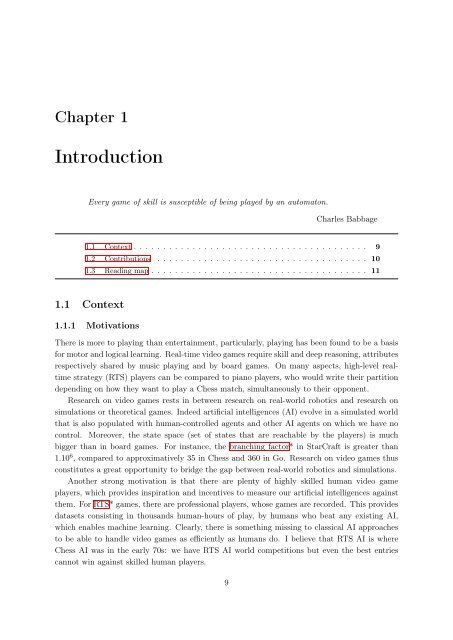Bayesian Programming and Learning for Multi-Player Video Games ...
Bayesian Programming and Learning for Multi-Player Video Games ...
Bayesian Programming and Learning for Multi-Player Video Games ...
You also want an ePaper? Increase the reach of your titles
YUMPU automatically turns print PDFs into web optimized ePapers that Google loves.
Chapter 1<br />
Introduction<br />
Every game of skill is susceptible of being played by an automaton.<br />
Charles Babbage<br />
1.1 Context . . . . . . . . . . . . . . . . . . . . . . . . . . . . . . . . . . . . . . . . 9<br />
1.2 Contributions . . . . . . . . . . . . . . . . . . . . . . . . . . . . . . . . . . . . 10<br />
1.3 Reading map . . . . . . . . . . . . . . . . . . . . . . . . . . . . . . . . . . . . . 11<br />
1.1 Context<br />
1.1.1 Motivations<br />
There is more to playing than entertainment, particularly, playing has been found to be a basis<br />
<strong>for</strong> motor <strong>and</strong> logical learning. Real-time video games require skill <strong>and</strong> deep reasoning, attributes<br />
respectively shared by music playing <strong>and</strong> by board games. On many aspects, high-level realtime<br />
strategy (RTS) players can be compared to piano players, who would write their partition<br />
depending on how they want to play a Chess match, simultaneously to their opponent.<br />
Research on video games rests in between research on real-world robotics <strong>and</strong> research on<br />
simulations or theoretical games. Indeed artificial intelligences (AI) evolve in a simulated world<br />
that is also populated with human-controlled agents <strong>and</strong> other AI agents on which we have no<br />
control. Moreover, the state space (set of states that are reachable by the players) is much<br />
bigger than in board games. For instance, the branching factor* in StarCraft is greater than<br />
1.10 6 , compared to approximatively 35 in Chess <strong>and</strong> 360 in Go. Research on video games thus<br />
constitutes a great opportunity to bridge the gap between real-world robotics <strong>and</strong> simulations.<br />
Another strong motivation is that there are plenty of highly skilled human video game<br />
players, which provides inspiration <strong>and</strong> incentives to measure our artificial intelligences against<br />
them. For RTS* games, there are professional players, whose games are recorded. This provides<br />
datasets consisting in thous<strong>and</strong>s human-hours of play, by humans who beat any existing AI,<br />
which enables machine learning. Clearly, there is something missing to classical AI approaches<br />
to be able to h<strong>and</strong>le video games as efficiently as humans do. I believe that RTS AI is where<br />
Chess AI was in the early 70s: we have RTS AI world competitions but even the best entries<br />
cannot win against skilled human players.<br />
9


